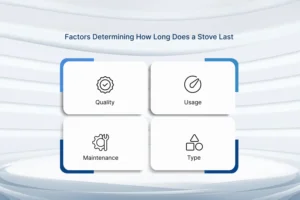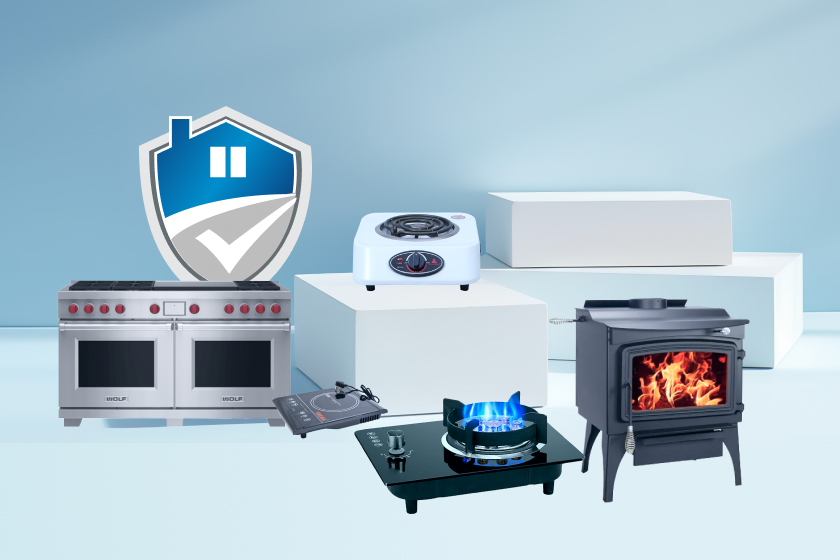Your stove is the heart of your kitchen, helping you prepare everything from daily meals to festive feasts. But have you ever paused to wonder how long does a stove last?
Understanding your stove’s lifespan is more important than you might think. It helps you decide whether to invest in a brand-new model or stick with repairs to keep your trusty appliance running a little longer.
The lifespan of cookstoves typically ranges from 10 to 15 years, but it depends on the type you own. Knowing what to expect from your specific type can save you time and money in the long run. Let’s uncover the truth about various types, their longevity, and how to make the most of yours.
Table of Contents
Types of Stoves and Their Average Lifespan
Your cookstove choice directly impacts how often you prepare meals at home versus grabbing something quick on the go. Also, the answer to the most asked question, “How long does a stove last?” depends on the type you pick.
Here’s a guide to the seven most popular types: gas, electric, induction, dual-fuel, smart, pellet, and wood burning ranges. Read on to find out which type matches your cooking habits and their longevity while weighing the pros and cons.
Gas Stove
Gas cookstoves operate on natural gas or propane, so you’ll need a gas line installed in your home. Typically featuring two to six burners, they can handle multiple cooking tasks with ease and efficiency.
The heat control is responsive, making them ideal for everything from slow simmering to high-heat searing. However, they emit combustion gases, so installing proper ventilation, such as a range hood, is essential.
For those who want precision and control in cooking, gas stoves are a classic choice as long as ventilation is in place.
How long does a gas stove last?
Gas stoves last from 10-15 years in general, and they can serve even longer with proper care and maintenance. Their average lifespan is almost two to five years longer than their electrical counterparts. This is why gas cookers are considered the most durable and reliable option for homeowners.
Electric Stove
Ever wondered why electric cookstoves are so popular? They offer flexibility, easy cleaning, and consistent cooking with heated coils or smooth glass tops. The 240-volt outlet is standard in most kitchens, which an electric oven requires. Metal coils heat pots directly, making boiling and simmering more efficient.
Furthermore, glass cooktops provide a stable surface for cookware and are easy to clean. If you want to cook food evenly with dry heat, delivering perfect results every time, the electric range is the right pick.
How long does an electric stove last?
Much like gas ranges, electric cookstoves are built to last, offering a reliable cooking companion for up to 13 years.
Induction Stove
Induction ranges heat cookware directly using electromagnetic energy, meaning faster cooking and better energy efficiency than electric ones. They offer precise heat control for quick boiling and searing.
Plus, they’re safer for families with young children or pets since the cooking surface stays cool. You can consider switching to induction for more control and safety while cooking.
What is the average lifespan of induction stove?
Induction cooktops are designed to last approximately ten years or about 10,000 hours of cooking use.
Stoves don’t last forever, but a home warranty keeps you prepared for repairs or replacements. Call 800-670-8931 to discover our plans.
Dual-fuel Stove
If you wish to have a perfect mix of gas and electric cooking in your kitchen, a dual-fuel type delivers exactly that! Gas burners offer precise heat control, while electric ovens ensure even baking every time.
Installation needs gas and electricity, so calling a professional is necessary. Sure, they’re a premium option, but they deliver unmatched performance for home chefs who love cooking.
How long does a dual-fuel stove last?
A dual-fuel cookstove, if maintained properly, has a typical lifespan of 13 to 15 years. Premium models may last close to 20 years. Their durability relies on both quality and maintenance efforts.
Smart Stove
Imagine cooking smarter with app-connected stoves! These Smart ovens offer temperature control, recipes, and safety features remotely. While innovative, they’re expensive, internet-reliant, and challenging for non-tech users. Also, repairs can be pricier than traditional models.
Can a smart stove last for 15 years?
Typically, its lifespan is 13-15 years with good care, though this varies based on model and daily use.
Pellet Cooking Stove
Pellet ranges are a cleaner, safer, and energy-efficient choice, offering both cost savings and a modern design for your home. They operate with simple systems, including hoppers, burn pots, ash pots, blowers, and manual or built-in controls.
How long does a pellet stove last?
The average lifespan ranges from 10 to 15 years. Its longevity is largely determined by its quality and regular maintenance.
Wood Burning Stove
You can enjoy the dual benefits of a wood-burning oven: heating your space and cooking meals with the right stove top and cookware. It’s steel or cast-iron body encloses the fire, spreading heat outward while smoke escapes through a flue leading to a chimney.
What is the average lifespan of wood burning stove ?
With proper care and routine cleaning, a quality wood burning range can last anywhere from 10 to 20 years or longer.
Factors Determining How Long Does a Stove Last

-
-
- Quality:
Choosing a high-quality cooking range is a smart investment that brings lasting value. Reputable brands use durable materials, ensuring reliability and fewer repairs. Professional installation further enhances performance and lifespan. - Usage:
It’s obvious that frequent use will lead to more wear and tear, but proper handling can minimize damage. Following usage instructions and taking regular care can keep your cookstove in optimal condition, no matter how often you use it. - Maintenance:
Routine cleaning and inspections are vital for keeping your range in great condition. Also, promptly addressing minor issues ensures it stays efficient and helps prolong its lifespan. - Type:
The question, “how long does a stove usually last?” also hinges on its type. Gas ranges are often praised for their durability, lasting up to 15 years with proper care. Each type’s longevity depends on its unique design and upkeep needs.
- Quality:
-
How do you know it’s Time for a Replacement?
Every appliance has its limits, and your cookstove is no exception. Watch for these warning signs before deciding to upgrade.
-
-
- Are Your Burners Acting Up?
When electric burners heat unevenly or gas flames lose their steady blue hue, it might be time to upgrade. - Odd Sounds or Smells?
Clicking noises, screeching sounds, weird gas or burning odors mean something’s off. Address it immediately before it worsens! And it might be a sign for replacement. - Does It Look Worn?
Rust, cracks, or chips on the surface aren’t just unsightly. They’re a sign your kitchen needs a new one.
- Are Your Burners Acting Up?
-
Summing It Up
Hope by now, you have the answer to the question, “How long does a stove last?” Yes, quality and care hold the key. A cooking range from a trusted manufacturer, paired with consistent upkeep, can easily surpass its average lifespan.
You don’t have to sacrifice affordability for quality. Many budget-friendly options are built to last, providing a great mix of value and durability. Also, if it is covered under a home warranty, the repairs and replacements are no longer a concern.
Ultimately, your stove’s future depends on how well you treat it. So, give it some love, and it’ll reward you with years of delicious meals.

